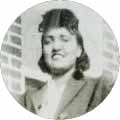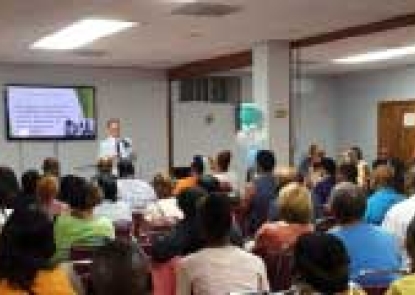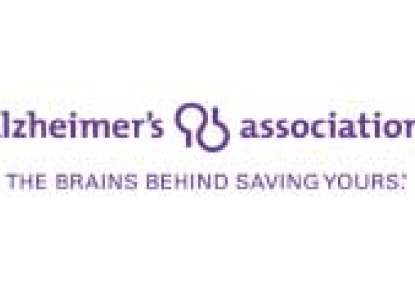Henrietta Lacks Memorial Award
Honoring outstanding community-university programs in Baltimore
The Henrietta Lacks Memorial Award was established in 2013 in honor of former Turner Station resident and Johns Hopkins cancer patient Henrietta Lacks, whose cells helped make possible ground-breaking advances in medical research. The Johns Hopkins Urban Health Institute (UHI) offers this $15,000 award to Baltimore programs co-developed by Johns Hopkins faculty, students, or staff and community-based organizations to highlight the importance of community–university collaborations, recognize their impact, and support their continued work. We encourage you to review our guiding principles and best practices for community engagement.
The monetary gift and award are presented to the primary community collaborator during the annual Henrietta Lacks Memorial Lecture, hosted by the Johns Hopkins Institute for Clinical and Translational Research (ICTR). The goal of the Henrietta Lacks Memorial Lecture is to describe the reach and complexity, both biomedically and ethically, of the story of Mrs. Henrietta Lacks and HeLa cells, as well as to provide some insight into the past, present, and future of the conduct of clinical research. By honoring Mrs. Lacks and the positive global impact of HeLa cells through this lecture series, the Johns Hopkins ICTR hopes to acknowledge, thank, and honor everyone who participates in the clinical research process.
The 2025 annual Henrietta Lacks Memorial Lecture will take place on Saturday, October 4, 2025 (details TBA).
Who is Henrietta Lacks?

Henrietta Lacks was an African-American woman who underwent treatment for an aggressive form of cervical cancer at Johns Hopkins Hospital in 1951. In addition to providing her with medical care, Henrietta’s doctor at Hopkins removed some of her cancerous cells to use in research without getting her written consent. It’s important to note that at this time the practice of obtaining informed consent from cell or tissue donors was essentially unknown among academic medical centers.
Despite receiving a high standard of medical treatment, Mrs. Lacks ultimately succumbed to this cancer at the young age of 31. However, her cells—called "HeLa" from the first two letters of her first and last names—remarkably continued to reproduce in the laboratory. Researchers around the world had been trying to identify or develop a standardized human cell line that could be reproduced in a laboratory setting; they knew that this kind of cell line would provide numerous opportunities to improve the human condition by allowing them to better understand, treat, and prevent a wide range of diseases.
“Voices in My Head” Youth Mental Health Project
Led by middle schoolers with adult guidance, this program leverages technology to increase accessibility, engagement, and peer support, ultimately empowering youth to lead healthier lives.

Maryland Hunger Solutions
Maryland Hunger Solutions is an advocacy and outreach organization seeking to end hunger by demonstrating the importance of school meals and out-of-school-time meals for child diet quality and food security.

Thread: The New Social Fabric
Thread: The New Social Fabric is a long-standing partnership with Johns Hopkins University to end social isolation and build a more equitable culture where everyone thrives.

The Granny Project: A Youth-Led Response to Adolescent Food Insecurity
The Granny Project uses an intergenerational approach by pairing Grannies with young people across Baltimore to teach them how to make quick, healthy, and affordable meals.

MERIT Health Leadership Academy
Working collaboratively with Johns Hopkins Medicine, MERIT educates, mentors, and provides resources to students from across Baltimore City to enter the field of medicine.

CHECC-uP Cervical Cancer in Minority Women with HIV Project
Through the CHECC-uP Project, Older Women Embracing Life (OWEL) works in partnership with John Hopkins School of Nursing to help reduce the occurrence of, and offer early treatment for, cervical cancer among women living with HIV.

Turnaround Tuesday
Turnaround Tuesday is a movement of Baltimoreans United in Leadership Development (BUILD). Staff members and volunteers meet every Tuesday morning to help unemployed and returning citizens re-enter the workforce.

SquashWise Youth Development Program
SquashWise Youth Development Program is a unique youth development program providing long-term academic and social support to public school students in Baltimore City, combining intensive academic tutoring with instruction in the sport of squash.

The Pythias A. and Virginia I. Jones African American Community Forum on Memory Loss
The Pythias A. and Virginia I. Jones African American Community Forum on Memory Loss is an annual, day-long event for families of individuals with Alzheimer’s disease, dementia, or other illnesses that create memory loss. The Forum provides information on research and clinical trials, support services and other resources to hundreds of families.

Men and Families Center, Inc.
The Men and Families Center, Inc. is a family services agency. Their mission is to create safer, more resilient men, women, children and families by supporting them in developing their inner strengths, life skills, parenting skills and networks of resources through holistic approaches that move them towards self-sufficiency and self- empowerment.

Safe Streets East
Safe Streets East is a community mobilization and outreach program designed to combat shootings and homicides. Safe Streets Baltimore uses a unique, interdisciplinary, public health approach to violence prevention.

Moveable Feast
Moveable Feast is one of over a dozen established community-university collaborations from across the city nominated for the award. Founded in 1989, Moveable Feast puts nutritious food on the table for people in Maryland with AIDS, breast cancer and other severe illnesses.

Intersection of Change
Intersection of change (formerly newborn holistic ministries) is dedicated to providing programs that enrich the economic, social and spiritual lives of those dealing with poverty related issues in sandtown-winchester and surrounding communities.
